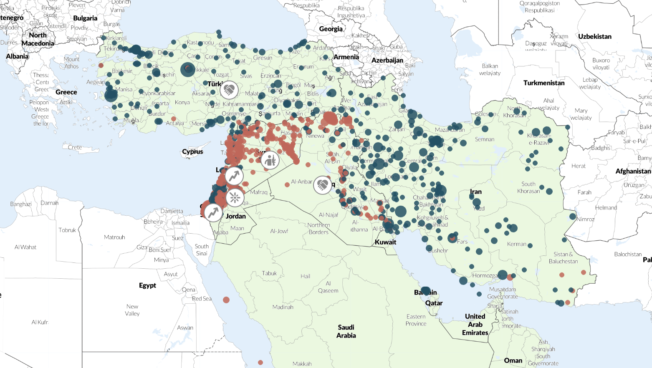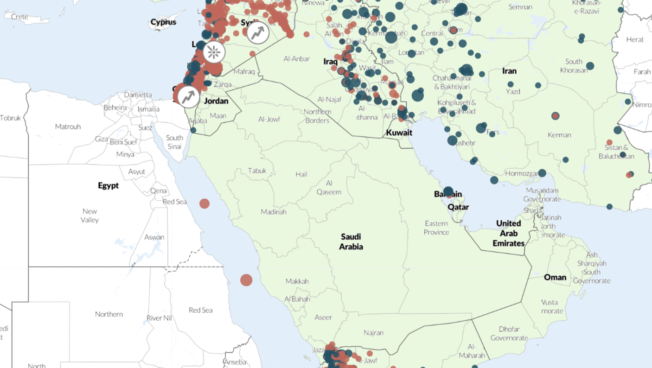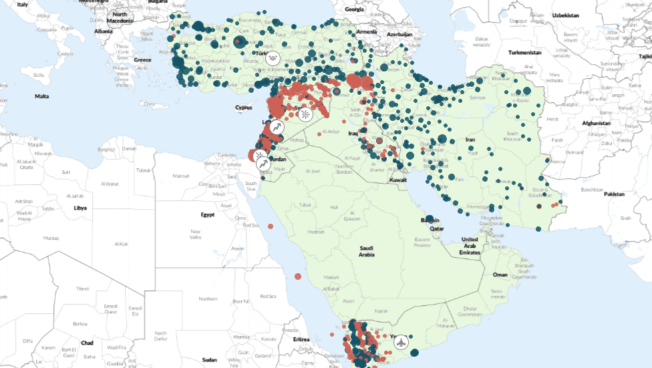Regional Overview
Middle East
April 2023
Posted: 4 May 2023
 Yemen: Violence drops to lowest wartime levels amid hopes for a renewed truce
Yemen: Violence drops to lowest wartime levels amid hopes for a renewed truce
Last month, political violence in Yemen dropped by 30% compared to the month prior, reaching the lowest level since the regionalization of the war in March 2015. This steep decrease coincided with a five-day Saudi and Omani delegation visit led by the Saudi Ambassador to Yemen to the capital city of Sanaa, amidst Oman-brokered peace negotiations between Houthi de facto authorities and Riyadh.1Asharq al-Awsat, ‘Al-Jaber Visits Sanaa to Discuss Reaching Comprehensive Political Solution in Yemen,’ 11 April 2023 Although no deal was announced following the visit, signs of detente materialized in the following days with the second-largest exchange of detainees between the conflict parties.2International Committee of the Red Cross, ‘Yemen & Saudi Arabia: Families reunited as more than 970 conflict-related detainees released in two operations over four days,’ 17 April 2023 Ongoing negotiations center on a reopening of Yemen’s ports and airports, the payment of civil servants salaries in Houthi-controlled areas, direct talks between the Houthis and the Internationally Recognized Government (IRG), and a two-year political transition.3Saeed al-Batati, ‘Houthi agree to restore UN-brokered truce, negotiate with opponents,’ Arab News, 6 April 2023 According to ACLED’s CAST predictions, the decline in violence associated with the peace negotiations is likely to continue in May 2023. Yemen spiraled into a civil war in 2014, when the Houthis ousted the IRG from Sanaa. The conflict was regionalized in March 2015 by the intervention of the Saudi-led coalition in support of the IRG.
 Iraq: Turkey targets Syrian Kurdish commander in Iraq amid increased airstrikes on PKK forces
Iraq: Turkey targets Syrian Kurdish commander in Iraq amid increased airstrikes on PKK forces
In April, Turkey escalated its operations in northern Iraq targeting objectives linked with the Kurdistan Workers’ Party (PKK). Notably, on 7 April, suspected Turkish drone strikes targeted the convoy of Mazlum Abdi – a commander of the Syrian Democratic Forces (QSD) considered by Turkish authorities a “terrorist” and a PKK leader.4Reuters, ‘Top Erdogan aide raps U.S. treatment of Syrian Democratic Forces’ commander,’ 24 October 2019 Abdi – a Washington ally in countering the Islamic State (IS) – was traveling with at least three US personnel near the Sulaymaniyya airport. The drone strikes resulted in no casualties,5Michael R. Gordon, ‘Drone strike in Iraq targets Syrian Kurdish leader, a U.S. ally,’ The Wall Street Journal, 7 April 2023 and came a few days after Turkey imposed a three-month flight ban on Sulaymaniyya’s airport because of suspected PKK infiltrations.6Karwan Faidhi Dri, ‘Mazloum Abdi blames Turkey for Sulaimani drone attack,’ Rudaw, 8 April 2023 The presidency of the Iraqi federal government condemned Ankara’s drone attack,7Arab News, ‘Iraqi presidency calls on Turkiye to ‘apologize’ for shelling Sulaymaniyah airport,’ 8 April 2023 while protests erupted in Erbil and Sulaymaniyya calling for the withdrawal of Turkish forces. The drone attack took place amid a 20% increase in Turkish airstrikes targeting the PKK in northern Iraq, following an upward trend that began in March 2023 after a lull in Turkish activity caused by the February earthquakes. Turkey and the PKK are engaged in a long-standing conflict over ethnic rights in southeastern Turkey and across the border in northern Iraq.
 Turkey: New trends in election-related violence
Turkey: New trends in election-related violence
Political violence increased in Turkey in April by 30% compared to the month prior, driven by election-related events. New typologies of violence emerged ahead of upcoming elections, including the targeting of electoral offices and political candidates across Turkey. Unidentified gunmen carried out drive-by shootings targeting electoral offices belonging to the ruling Justice and Development Party (AKP) and its main rival the Republican People’s Party (CHP) in Uskudar and Atasehir districts, resulting in no casualties. Meanwhile, rioters with unclear affiliations attacked election offices belonging to the CHP and the Green Left Party (Yesil Sol Parti) in Beyoglu and Efeler districts, while others physically assaulted members of the Iyi Party while handing out election brochures. Rioters also attacked the convoy of President Recep Tayyip Erdogan’s main rival for the presidency, Kemal Kilicdaroglu, while he campaigned in the southeastern city of Adiyaman. Turkey’s general elections will take place on 14 May, and voters will select a new president and 600 members of parliament. Ahead of the previous general elections, in June 2018, ACLED recorded a 90% increase of political violence compared to the month prior.
 Syria: Increased targeting of civilians amid surge in IS activity
Syria: Increased targeting of civilians amid surge in IS activity
IS engaged in heightened levels of attacks against civilians in April, continuing an upward trend that began in March. Compared to the monthly average for 2022, IS carried out twice as many attacks on civilians in April 2023. Most attacks targeted civilians searching for truffles in the Syrian desert.8The Guardian, ‘Suspected IS fighters kill 26 desert truffle hunters in Syria,’ 16 April 2023 Since the start of the truffle season, which runs from February to April, ACLED records over 80 events targeting truffle hunters and more than 300 reported fatalities — including civilians and pro-regime fighters — mostly resulting from landmines or direct IS attacks. The number of fatalities during this season marks it as the deadliest since IS began attacking truffle hunters in 2019.9Raja Abdulrahim, ‘Truffle Hunting in Syria, Once a Beloved Pastime, is Now a Danger’, The New York Times, 10 April 2023; Bassem Mroue, ‘IS Attacks on Syria Truffle Hunters are Deadliest in a Year’, Independent, 23 February 2023 The heightened levels of civilian targeting comes amidst a general surge of IS activity in Syria. In April 2023, ACLED also records a rise in IS attacks on pro-regime forces, pro-Iran militias, and QSD forces in Homs, al-Hasaka, al-Raqqa, and Aleppo provinces. Since the territorial defeat of IS in Syria in 2019, the remaining IS cells have largely engaged in ambushes, armed attacks, and explosions against regime and QSD forces, and civilians in the west Euphrates region and the Syrian desert.
 Palestine and Israel: Violence drops during the religious season despite incidents in East Jerusalem
Palestine and Israel: Violence drops during the religious season despite incidents in East Jerusalem
April 2023 opened amid fears that the overlap of the Muslim holy month of Ramadan, the Jewish holiday of Passover, and the Christian holiday of Easter could lead to an escalation of violence in Israel and Palestine.10BBC, ‘Ramadan and Passover raise tensions at Jerusalem holy site,’ 5 April 2023 However, compared to March, levels of political violence only slightly increased in Israel, while they dropped by over 10% in Palestine despite a spate of Ramadan-related violence in East Jerusalem. As recorded in previous years, violence erupted following incidents around the al-Aqsa compound. On 5 April, Israeli forces raided the religious site injuring at least 12 unarmed worshippers and detaining 400 others. Due to the politico-religious significance of al-Aqsa, Arab ‘lone wolves’ responded to the raid with multiple forms of violence. On 7 April, a car-ramming attack killed an Italian tourist and injured seven others in Tel Aviv city. On the same day, a Palestinian gunman shot at a passing settler car in Nablus, killing a British-Israeli mother and her two daughters. Meanwhile, Palestinian Islamic Jihad militants fired rockets from the Gaza Strip towards Israel, with shelling also coming from Lebanon. Israeli forces retaliated by shelling Gaza, while raids continued in the West bank, resulting in over eight Palestinian rioters and militants killed.
See More
See the Codebook and the User Guide for an overview of ACLED’s core methodology. For additional documentation, check the Resource Library. Region-specific methodology briefs can be accessed below.
Links:







